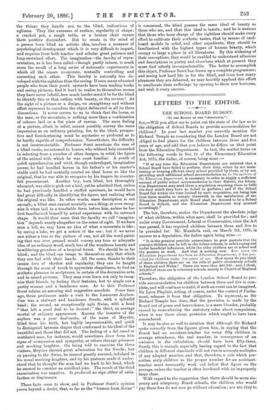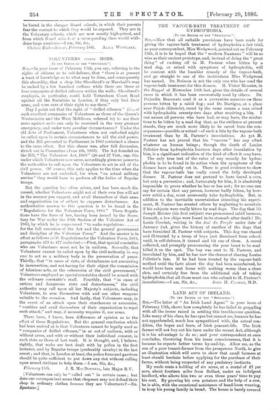LETTERS TO THE EDITOR.
THE SCHOOL BOARD BUDGET. rTo THZ EDITOR OF THE " EPECTATOR."1 SIR,—Will you allow me to point out the state of the law as to
the obligation of School Boards to provide accommodation for children ? In your last number you correctly mention Sir Richard Temple as considering that the London Board are not obliged to find places for the children between three and five years of age, and add that you believe he differs on that point from the Education Department. In fact, the matter tarns on the following words in Sec. 18 of the Elementary Education Act, 1870, the italics, of course, being mine :—
"If at any time the Education Department are satisfied that a School Board have failed to perform their duty, either by not main- taining or keeping efficient every school provided by them, or by not providing such additional school accommodation as, in the opinion of the Education Department, is necessary in order to supply a sufficient amount of public school accommodation in their district, the Educa- tion Department may send them a requisition requiring them to fulfil the duty which they have so failed to perform ; and if the School Board fail within the time limited by such requisition, not being less than three months, to comply therewith to the satisfaction of the Education Department, such Board shall be deemed to be a School Board in default, and the Education Department may proceed accordingly."
The law, therefore, makes the Department the absolute judge of what children, within what ages, shall be provided for ; and under every Government, Liberal or Conservative, since the Act was passed, it has required children between three and five to be provided for. Mr. Mundella said, on March 76, 1884, in answer to a deputation, the italics again being mine :—
" It is the greatest possible convenience to poor parents that the younger children can be left in the infant-schools, in safe keeping and under beneficial influences, while the older children are at school and the parents at work. And that is nothing new. Ever since tire Education Department has been an Education Department, it has pro- vided for children under five years of age. How many do you think of these children there are on the rolls of public elementary schools in England and Wales ? There are more than 400,000; and, I think, 260,000 of these are in voluntary schools, mainly in Church of England schools."
Therefore, the obligation of the London School Board to pro- vide accommodation for children between three and five is com- plete, and will continue so until, if such an event can be imagined, Sir Lyon Playfair, acting, of course, under the control of Parlia- ment, releases it from that obligation. To represent, as Sir Richard Temple has done, that the provision is made by the Board out of grace and benevolence, is a mere blunder, probably caused by remembering the statutory rules about compulsion, when it was those about provision which ought to have been remembered.
It may be also as well to mention that although Sir Richard spoke correctly from the figures given him, in saying that the Board had an assistant-teacher for every fifty children in average attendance, the real number, in consequence of an omission in the calculation, should have been fifty-three. Surely this is enough, especially having regard to the fact that children in different standards will not run in accurate multiples of any adopted number, and that, therefore, a rule which pre- scribes sixty children as the proper number for an assistant. teacher must necessarily work out below that figure on the average, unless the teacher is often burdened with an improperly large class.
With regard to the suggestion that there should be more six- penny and ninepenny Board schools, the children who would pay those fees do not now go without education ; nor are they to be found in the cheaper Board schools, in which their parents fear the contact to which they would be exposed. They are in the Voluntary schools, which are now mostly high-priced, and from which Board scho As of a corresponding class would with- draw large numbers.—I am, Sir, &c.,



































 Previous page
Previous page